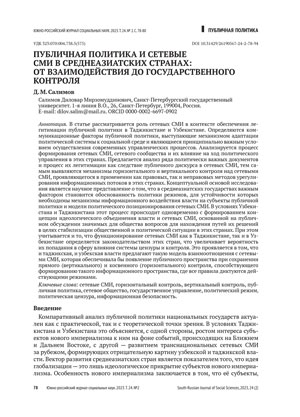Abstract
The article examines the role of online media in legitimizing public policy in Tajikistan and Uzbekistan. The communication aspects of public policy function as a system for adjusting the political climate to the social environment and are a crucial prerequisite for executing contemporary management processes. The paper analyzes the formation process of network media and communities, as well as their impact on political management in these countries. Several politically significant documents are analyzed and their legitimation through public discourse in online media is presented. This study reveals the practices of regulating information flows in online media, including both legal and non-legal methods of horizontal and vertical control implemented in these countries. The study is based on the scientific notion that in Central Asian states, regime policy validity becomes crucial, with stability indicated by the presence of authority mechanisms for information influence on public policy subjects and models of online media political positioning. In Uzbekistan and Tajikistan, this process is accompanied by the development of the idea of ideological unification of power and online media. This idea is based on public discussion of important societal issues, aimed at finding solutions that can help stabilize the social and political situation in both countries. This also takes into account the fact that online media in Tajikistan and Uzbekistan operate on the basis of these countries’ legislation, which increases the potential for their inclusion in the sphere of influence of the censorship and control system. This fact indicates that the Tajik and Uzbek authorities provide a model for online media relations that can support the emergence of a public space while upholding both direct (vertical) and indirect (horizontal) control. This model contributes to the formation of an information space where all rules are dictated by current regimes.
Keywords
References
Cheema, G. S., & Rondinelli, D. A. (2007). From Government Decentralization to Decentralized Governance. Decentralizing governance: Emerging concepts and practices. Washington: Brookings Institution Press.
Chris, E. (2013). Information Manipulation, Coordination and Regime Change. Review of Economic Studies, 80, 1422–1458.
Driscoll, J. (2012). Commitment Problems or Bidding Wars? Rebel Fragmentation as PeaceBuilding. Journal of Conflict Resolution, 1, 118–149. DOI: 10.1177/0022002711429696
Dumitrescu, D., Mugha, А. (2010). Mass Media and Democratic Politics. Handbook of Politics. Handbooks of Sociology and Social Research. N.Y.: Springer.
Gehlbach, S., Sonin, K. (2014). Government control of the media. Journal of Public Economics, 118, 163–171.
Ghuman, B.S. (2013). Ranjeet Singh Decentralization and Delivery of Public Services in Asia. Policy and Society, 32, 7–21. DOI: 10.1016/j.polsoc.2013.02.001
Green, J., Kingzette, J., Neblo, M. (2016). Deliberative Democracy and Political Decision Making. Oxford Research Encyclopedia of Politics. UK: Oxford University Press.
Hasanov, B. M. (2017). Internet-SMI v Uzbekistane i ikh vliyaniye na razvitiye grazhdanskogo obshchestva [Internet Media in Uzbekistan and Their Impact on the Development of Civil Society]. Lokus: lyudi, obshchestvo, kul’tury, smysly [Locus: People, Society, Cultures, Meanings], 2, 119–128.
Jansen, S. C. (1988). Censorship: The Knot that Binds Power and Knowledge. UK: Oxford University Press.
Kooiman, J. (1993). Findings, Speculations and Recommendations. Modern Governance, London Sage, 3, 249–262.
Luman, N. (2006). Differentsiatsiya [Differentiation]. Moskva: Logos.
Merrett, C. (2007). State Censorship and the Academic Process in South Africa. Illinois: The University of Illinois
Mukim, Dzh. (2006). Politika i informatsionnaya voyna [Politics and Information Warfare]. Dushanbe: Devashtich.
Mukimov, M. (2016). Mul’timediynaya zhurnalistika v Tadzhikistane [Multimedia journalism in Tajikistan]. Vestnik Tadzhikskogo natsional’nogo universiteta [Bulletin of the Tajik National University], 4(195), 262–269.
Mukimov, M. A. (2017). Informatsionnaya voyna i zashchita bezopasnosti mediynogo prostranstva [Information Warfare and Protecting the Security of the Media Space]. Dushanbe: Sino.
Mukimov, M. A. (2019). Novyye media i propaganda [New Media and Propaganda]. Vestnik Tadzhikskogo natsional’nogo universiteta [Bulletin of the Tajik National University], 1, 291–297.
Osman, W. (2019). Between the White House and the Kremlin: A Comparative Analysis of Afghan and Tajik Media. International Journal of Communication, 13, 619–641. DOI: 1932-8036/2019FEA0002
Rakhimdzhonov, Kh. U. (2016). Eticheskiye normy kak mekhanizm samoregulirovaniya v zhurnalistskikh soobshchestvakh Tadzhikistana [Ethical Norms as a Mechanism of Self-regulation in the Journalistic Communities of Tajikistan]. Dushanbe: Tadzhikskiy natsional’nyy universitet.
Rungsrisawat, S., Chankoson, T. (2020). Engagement with Online Media. Journal of Security and Sustainability Issues, 9, 1379–1391.
Rustamzoda, D. A. (2021). Professional’no-eticheskiye problemy radiozhurnalistiki v usloviyakh globalizatsii [Professional and Ethical Problems of Radio Journalism in The Context of Globalization]. Dushanbe: Irfon.
Salimov, D. M. (2023). SMI i politika: Tadzhikistan v poiskakh soglasiya [Media and Politics: Tajikistan in Search of Consent]. SPb: SPbGEU.
Salimov, D. M. (2022). Sredstva massovoy informatsii v politicheskom protsesse sovremennogo Tadzhikistana: funktsional’nyye osobennosti [Mass Media in the Political Process of Modern Tajikistan: Functional Features]. SPb: Sankt-peterburgskiy gosudarstvennyy universitet.
Sivyakova, Ye. V. (2009). Obshcherossiyskiye SMI kak institut publichnoy politiki: usloviya i tekhnologii proizvodstva publichnosti [All-Russian Media as an Institution of Public Policy: Conditions and Technologies for the Production of Publicity]. Moskva: Moskovskiy gosudarstvennyy universitet imeni M.V, Lomonosova.
Solov’yev. A. I. (2021). “Dokazatel’naya politika” i “politika dokazatel’stv”: dilemma postsovetskikh obshchestv [“Evidence politics” and “Evidence Politics”: The Dilemma of Post-Soviet Societies]. Kontury global’nykh transformatsiy: politika, ekonomika, parvo [Outlines of Global Transformations: Politics, Economics, Law], 5, 61–80.
Volodenkov, S. L. (2015). Tekhnologii internet-kommunikatsii v sisteme sovremennogo politicheskogo upravleniya [Internet Communication Technologies in the System of Modern Political Management]. Moskva: Moskovskiy gosudarstvennyy universitet imeni M. V. Lomonosova.


